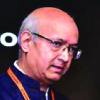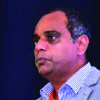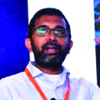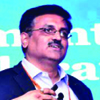
Dr B Anbuthambi
Executive Vice President
ICT Academy
ICT Academy Bridge® is one of the largest industry-institute interaction events in India, and this is our 44th edition. This is a one-of-its-kind and unique event that focuses exclusively on industry-institute interaction, which connects industry experts and academic leaders. This event is supported by various government departments and tech giants; thanks to them for making this journey possible.
We have over 800 higher education institutions as our members, and we provide holistic services to these institutions through our 7-Pillar model that includes faculty development, skill development, youth empowerment, digital empowerment, entrepreneurship development, research publications, and industry-institute interaction. We have partnered with more than 40 corporate for developing the skills of students and faculty members on par with industry standards. Recently, we have partnered with Automation Anywhere who is the leader in the Robotic Process Automation, to impart RPA skills in the students. We serve as a one-stop partner for every corporate to reach the nook and corner of the nation.

M Sivakumar
Chief Executive Officer
ICT Academy
ICT Academy started operating in Tamil Nadu in the year 2009. The objective of ICT Academy is to bridge the gap between industry and academia. In this pursuit, there are three key stakeholders, industry, academia and government; ICT Academy pursues leveraging all the three elements to ensure the industry-academia gap is bridged. Having convened 36 editions of Bridge conferences, ICT Academy continues to embark on the journey with the intent that is not just confined with India’s development, but with a vision of producing futuristic workforce for the entire world.
It is the 10th year of ICT Academy, whose credit is owed to the entire stakeholders of ICT Academy all through its journey since the inception. In fact, the entire state of Tamil Nadu has embraced ICT Academy with a big hand. ICT Academy was formed with the intent of providing value as a service. Value differs from one entity to the other invariably according to the perception of the matter in discussion. ICT Academy’s value proposition is to provide win-win solutions to all its stakeholders, which in turn adds to the growth of this great nation.

Dr Ashok Korwar
Founder
School of Design Thinking
It is not the job of colleges to develop products; institutions’ purpose is to develop human beings. However, it is no longer good enough to go to a college, get a good degree and go to work for the rest of your life, because things are always changing. Today’s technology is useless tomorrow; the fact is technologies change all the time, management issues change all the time, business models change all the time. Hence, this model of getting a degree and getting employed for a lifetime is not good. Technologies keep changing by the day and whatever learnt today is obsolete tomorrow or in the near future. Everything that you need for the span of your career requires learning. The industry cannot do it alone, as it does not have the intellectual horsepower to do it. Colleges cannot do it alone because they don’t have the understanding of the ongoing reality. So, the model that we need should encourage continuous learning, which should be done by academia and industry together.

Swapneel Doshi
Head - Delivery Transformation
Atos Syntel
One thing is very sure; business is changing whether we want to be a part of it or not. For the past thirty years, businesses have been facing a tremendous change in pace. Every business is investing technology irrespective of the domain it belongs to. Hence, newer technologies are also emerging by the day and give way to more new ones in a shorter span of their lives. In such a scenario, the ability to indulge in continuous learning is what the industry expects in its prospective teams. The other abilities that the industry looks for in candidates are the ability to observe and the ability to change. To put it straight, the industry does not confine with recruiting only those who are strong in technology; it can train them. But, the industry looks for those who have the ability to adapt to changes. Further, if academia could groom them in terms of behavioural skills, it would solve most of the problems faced.

Mandar Batavdekar
Head of Marketing, Communication & Analyst Relations
TCS
There are data points that state India is already the youngest nation, while another data projects that by 2030, India will be among the world’s top three economies. Further, India’s GDP per capita is expected to rise to $4300, up from $2000 today. All these data show that the conditions for the nation’s growth are in place. However, the question is, are we ready to embrace change in order to harvest the fruits of such imminent growth. On these lines, Tata has come up with an initiative Tata STRIVE - Right Skills, Bright Future. This is an initiative that aims at helping create a skilled workforce.
The immediate target of this initiative is to impact 1 Million people by 2022, enabling and enhancing livelihoods directly or through eco-system strengthening. Moreover, TCS and the World Economic Forum have forged into a partnership to equip 17.2 million people with digital skills too.

Arvind Tothadri
Vice President - Global Training and Certification
Automation Anywhere
Robotic Process Automation (RPA) is basically a technology, which sits on a laptop, desktop and creates something called software robots. Those bots mimic human behaviour to automate a lot of processes. These bots automate processes that are large numbers, rules-driven and very manual in nature. RPA is all about 100% compliance and no errors. RPA creates the time and mental space for humans to get liberated from the repetitive jobs they do by the day. Such opportunity of time will enable humans to indulge in evolving creative solutions, thereby improve the businesses or processes or both.
Moreover, RPA is considered as one of the eight future technologies by NASSCOM. There is a predicted number of 20 lac jobs to be created by those eight future technologies. While China is the leader in physical robotic automation, India is the hub for software automation. Hence, there are a lot of jobs likely to emerge in the RPA domain; but creating RPA skilled workforce is a pre-requisite to harvest this opportunity.

Deepankar Bhattacharyya
Head - India Education Programs
Autodesk
The world has a current population of 7 billion people, and we are expected to reach about 10 billion people by 2050, which is almost an increase of 30-40% in the next three decades. The other important fact is that there about 400,000 people who are joining the middle-class population day. This is also very significant because, with the growing middle-class population, there are implications like growing demand for technology gadgets, motorized transportation, food and shelter.
Moreover, other stats project that about 68% of the global population is expected to live in cities by 2050, which would require us to build more buildings i.e., 3600 buildings per day. Hence, with the growing population, as “more” is inevitable, developing new products and product innovation becomes very critical. The needs are constantly changing with the increasing population, and we need to fundamentally re-think the way we are working today, to keep pace with the change. In all, we should enable the learners with the ability to take on the new and emerging roles, which would be possible only through the right strategic initiatives that the industry and academia make collaboratively.

Saurabh Galgali
Solutions Director
Oracle Academy
Change in the industry occurs with the change in consumer behaviour. Consumers today, make informed choices and the businesses are changing to cater to such needs. Today, every brand uses multiple channels to communicate with its customers. Today, 75% of consumers use 3 or more channels to communicate with a brand. Irrespective of the domains the businesses belong to, technology integration into them has become the order of the day. In line with such disruptive transformation, Oracle has come up with various courses and skilling modules to enable the future workforce to keep pace with the changing careerscape.

Rajesh Kumar Singh
Global Head - Human Resources
KPIT
In today’s scenario, what we learn in one phase of our lives will not be sufficient to make a career in any industry. It requires consistent learning abilities to survive in a changing technology landscape. To hamper this situation we should attempt to re-imagine the curriculum; particularly integrate internship opportunities that completely give the students strong hands-on experience. Such initiatives will enable the students to acquire skills like creativity, problem-solving, decision making etc. In all, acquiring skills is possible only when the beneficiary is exposed to real-time situations as we do with teaching swimming.

Sanjay Gopinath
Head Marketing and Communication
MathWorks
MathWorks is deeply rooted in education. 6500+ universities around the world are already on our tools. We provide academic support for research fellowships, student competitions, and curriculum development. Moreover, every year tens of thousands of engineers enter the workplace with MATLAB and Simulink product skills and experience.
With that briefing about MathWorks, let’s look into the skill gap that is widely talked about in forums like this. The skill gap that was identified years back still exists and the battle to mitigate it is on. The skill challenges are as dynamic as they emerge with a changing business and customer behaviour scenario. Hence, there is a part of the industry, the academia and the government to make the ends meet.

Amita Karadkhedar
Vice President
Citi Bank
Technology around us is evolving rapidly, but we are not updating ourselves with the relevant skills, so we are struggling to use the technology to the fullest potential. According to the 2018 Future of jobs report, 75 million jobs are expected to be displaced by 2022 in 20 major economies. At the same time, technological advances and new ways of working could also create 133 million new roles, driven by large scale growth in new products and services that would allow people to work with machines and algorithms to meet the demands of the demographic shifts and economic changes. Over the next decade, the 14 G20 countries could miss out as much as USD 11.5 trillion of cumulative growth promised by intelligent technologies, if they can’t meet future skills demand.
Industry-led action for the Future of Work by WEF revealed that 60% of US companies believe that skill gaps prevent them from implementing the right technology and, consequently, from effectively adapting to the volatile business environment. According to McKinsey survey, 66% of executives see upskilling and re-skilling of their workforce as one of the top ten priorities with 62% believing that they will need to re-skill more than 25% of the workforce between now and 2023. Therefore, the Future of Work will be the race between education and technology. College Degree program may not be on par with the pace the technology is changing. Many students are prepared for the job which may not exist in the future. Institutions need to constantly figure the ways to keep their standards on par with the industrial evolutions.

Mangesh Mulmule
Senior Vice President - DTS Global
Virtusa
In fifteen years from now, life will change more dramatically than ever before. The way in which energy is produced, education is imparted, agriculture is done, and healthcare is provided. Technology will be the baseline for all such changes happen.
Enabling people's readiness for change adoption via education, training, exposure is imperative at this juncture. However, we should be aware that in such pursuit, the importance of values and ethics should not be left behind.

Sachin Vaidyal
Senior Architect
VMware
The industry is moving towards the application-centric. There are various kinds of applications and one of the keys is Intent-Based Applications Services. These applications are hybrid and multi-cloud, unlike traditional storage services. In cloud applications, security risks are a great concern and a management nightmare. In companies, 80% of the investment in security is done on reactive solutions. But, VMware is building applications that are in-built with solutions to prevent applications from cyber-attacks. Also, I would like to make a mark that VMware has a lot of applications in the analytics area as well.